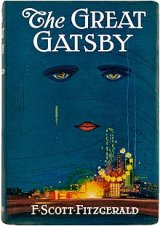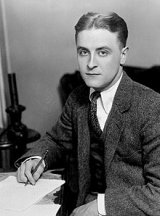The Great Gatsby Page #11
The Great Gatsby is a 1925 novel by American writer F. Scott Fitzgerald. Set in the Jazz Age on Long Island, near New York City, the novel depicts first-person narrator Nick Carraway's interactions with mysterious millionaire Jay Gatsby and Gatsby's obsession to reunite with his former lover, Daisy Buchanan. The novel was inspired by a youthful romance Fitzgerald had with socialite Ginevra King, and the riotous parties he attended on Long Island's North Shore in 1922
drip of the banjoes on the lawn. I was still with Jordan Baker. We were sitting at a table with a man of about my age and a rowdy little girl, who gave way upon the slightest provocation to uncontrollable laughter. I was enjoying myself now. I had taken two finger-bowls of champagne, and the scene had changed before my eyes into something significant, elemental, and profound. At a lull in the entertainment the man looked at me and smiled. “Your face is familiar,” he said politely. “Weren’t you in the First Division during the war?” “Why yes. I was in the Twenty-eighth Infantry.” “I was in the Sixteenth until June nineteen-eighteen. I knew I’d seen you somewhere before.” We talked for a moment about some wet, grey little villages in France. Evidently he lived in this vicinity, for he told me that he had just bought a hydroplane, and was going to try it out in the morning. “Want to go with me, old sport? Just near the shore along the Sound.” “What time?” “Any time that suits you best.” It was on the tip of my tongue to ask his name when Jordan looked around and smiled. “Having a gay time now?” she inquired. “Much better.” I turned again to my new acquaintance. “This is an unusual party for me. I haven’t even seen the host. I live over there—” I waved my hand at the invisible hedge in the distance, “and this man Gatsby sent over his chauffeur with an invitation.” For a moment he looked at me as if he failed to understand. “I’m Gatsby,” he said suddenly. “What!” I exclaimed. “Oh, I beg your pardon.” “I thought you knew, old sport. I’m afraid I’m not a very good host.” He smiled understandingly—much more than understandingly. It was one of those rare smiles with a quality of eternal reassurance in it, that you may come across four or five times in life. It faced—or seemed to face—the whole eternal world for an instant, and then concentrated on you with an irresistible prejudice in your favour. It understood you just so far as you wanted to be understood, believed in you as you would like to believe in yourself, and assured you that it had precisely the impression of you that, at your best, you hoped to convey. Precisely at that point it vanished—and I was looking at an elegant young roughneck, a year or two over thirty, whose elaborate formality of speech just missed being absurd. Some time before he introduced himself I’d got a strong impression that he was picking his words with care. Almost at the moment when Mr. Gatsby identified himself a butler hurried toward him with the information that Chicago was calling him on the wire. He excused himself with a small bow that included each of us in turn. “If you want anything just ask for it, old sport,” he urged me. “Excuse me. I will rejoin you later.” When he was gone I turned immediately to Jordan—constrained to assure her of my surprise. I had expected that Mr. Gatsby would be a florid and corpulent person in his middle years. “Who is he?” I demanded. “Do you know?” “He’s just a man named Gatsby.” “Where is he from, I mean? And what does he do?” “Now you’re started on the subject,” she answered with a wan smile. “Well, he told me once he was an Oxford man.” A dim background started to take shape behind him, but at her next remark it faded away. “However, I don’t believe it.” “Why not?” “I don’t know,” she insisted, “I just don’t think he went there.” Something in her tone reminded me of the other girl’s “I think he killed a man,” and had the effect of stimulating my curiosity. I would have accepted without question the information that Gatsby sprang from the swamps of Louisiana or from the lower East Side of New York. That was comprehensible. But young men didn’t—at least in my provincial inexperience I believed they didn’t—drift coolly out of nowhere and buy a palace on Long Island Sound. “Anyhow, he gives large parties,” said Jordan, changing the subject with an urban distaste for the concrete. “And I like large parties. They’re so intimate. At small parties there isn’t any privacy.” There was the boom of a bass drum, and the voice of the orchestra leader rang out suddenly above the echolalia of the garden. “Ladies and gentlemen,” he cried. “At the request of Mr. Gatsby we are going to play for you Mr. Vladmir Tostoff’s latest work, which attracted so much attention at Carnegie Hall last May. If you read the papers you know there was a big sensation.” He smiled with jovial condescension, and added: “Some sensation!” Whereupon everybody laughed. “The piece is known,” he concluded lustily, “as ‘Vladmir Tostoff’s Jazz History of the World!’ ” The nature of Mr. Tostoff’s composition eluded me, because just as it began my eyes fell on Gatsby, standing alone on the marble steps and looking from one group to another with approving eyes. His tanned skin was drawn attractively tight on his face and his short hair looked as though it were trimmed every day. I could see nothing sinister about him. I wondered if the fact that he was not drinking helped to set him off from his guests, for it seemed to me that he grew more correct as the fraternal hilarity increased. When the “Jazz History of the World” was over, girls were putting their heads on men’s shoulders in a puppyish, convivial way, girls were swooning backward playfully into men’s arms, even into groups, knowing that someone would arrest their falls—but no one swooned backward on Gatsby, and no French bob touched Gatsby’s shoulder, and no singing quartets were formed with Gatsby’s head for one link. “I beg your pardon.” Gatsby’s butler was suddenly standing beside us. “Miss Baker?” he inquired. “I beg your pardon, but Mr. Gatsby would like to speak to you alone.” “With me?” she exclaimed in surprise. “Yes, madame.” She got up slowly, raising her eyebrows at me in astonishment, and followed the butler toward the house. I noticed that she wore her evening-dress, all her dresses, like sports clothes—there was a jauntiness about her movements as if she had first learned to walk upon golf courses on clean, crisp mornings. I was alone and it was almost two. For some time confused and intriguing sounds had issued from a long, many-windowed room which overhung the terrace. Eluding Jordan’s undergraduate, who was now engaged in an obstetrical conversation with two chorus girls, and who implored me to join him, I went inside. The large room was full of people. One of the girls in yellow was playing the piano, and beside her stood a tall, red-haired young lady from a famous chorus, engaged in song. She had drunk a quantity of champagne, and during the course of her song she had decided, ineptly, that everything was very, very sad—she was not only singing, she was weeping too. Whenever there was a pause in the song she filled it with gasping, broken sobs, and then took up the lyric again in a quavering soprano. The tears coursed down her cheeks—not freely, however, for when they came into contact with her heavily beaded eyelashes they
Translation
Translate and read this book in other languages:
Select another language:
- - Select -
- 简体中文 (Chinese - Simplified)
- 繁體中文 (Chinese - Traditional)
- Español (Spanish)
- Esperanto (Esperanto)
- 日本語 (Japanese)
- Português (Portuguese)
- Deutsch (German)
- العربية (Arabic)
- Français (French)
- Русский (Russian)
- ಕನ್ನಡ (Kannada)
- 한국어 (Korean)
- עברית (Hebrew)
- Gaeilge (Irish)
- Українська (Ukrainian)
- اردو (Urdu)
- Magyar (Hungarian)
- मानक हिन्दी (Hindi)
- Indonesia (Indonesian)
- Italiano (Italian)
- தமிழ் (Tamil)
- Türkçe (Turkish)
- తెలుగు (Telugu)
- ภาษาไทย (Thai)
- Tiếng Việt (Vietnamese)
- Čeština (Czech)
- Polski (Polish)
- Bahasa Indonesia (Indonesian)
- Românește (Romanian)
- Nederlands (Dutch)
- Ελληνικά (Greek)
- Latinum (Latin)
- Svenska (Swedish)
- Dansk (Danish)
- Suomi (Finnish)
- فارسی (Persian)
- ייִדיש (Yiddish)
- հայերեն (Armenian)
- Norsk (Norwegian)
- English (English)
Citation
Use the citation below to add this book to your bibliography:
Style:MLAChicagoAPA
"The Great Gatsby Books." Literature.com. STANDS4 LLC, 2025. Web. 24 Feb. 2025. <https://www.literature.com/book/the_great_gatsby_1598>.








Discuss this The Great Gatsby book with the community:
Report Comment
We're doing our best to make sure our content is useful, accurate and safe.
If by any chance you spot an inappropriate comment while navigating through our website please use this form to let us know, and we'll take care of it shortly.
Attachment
You need to be logged in to favorite.
Log In